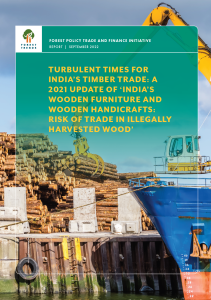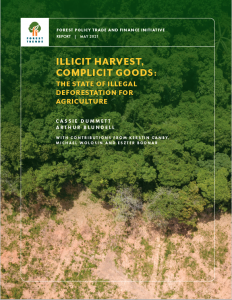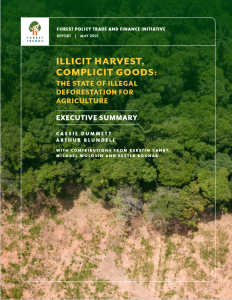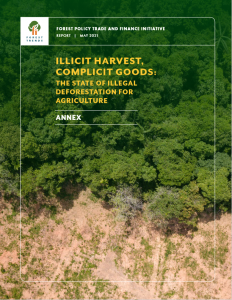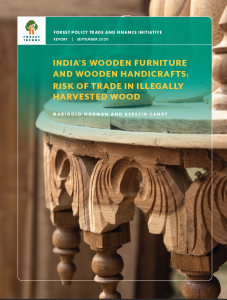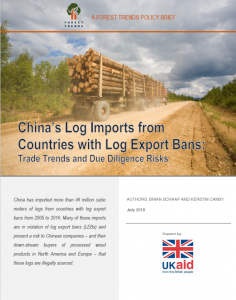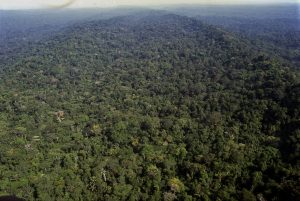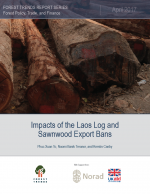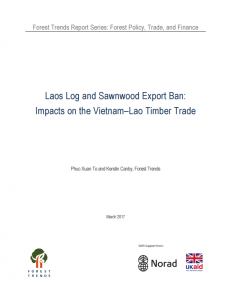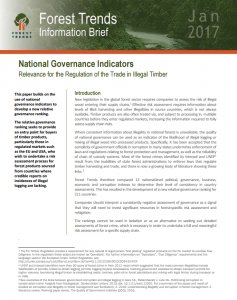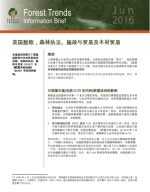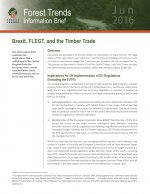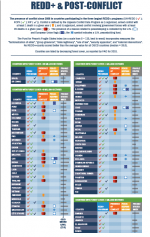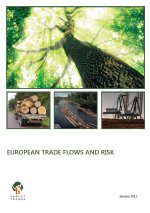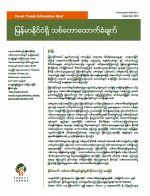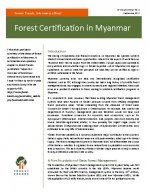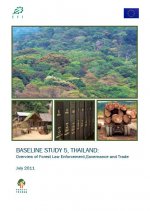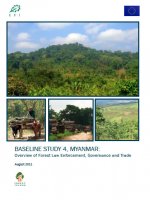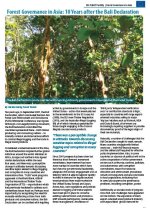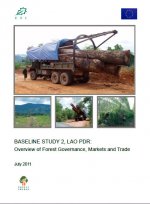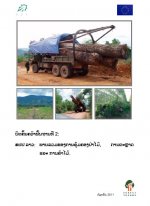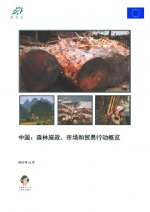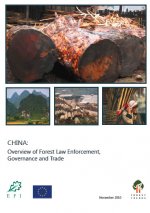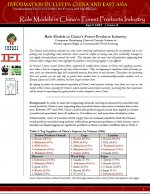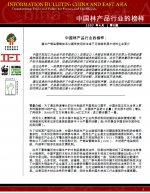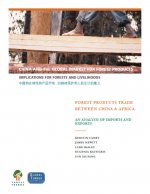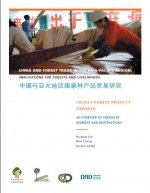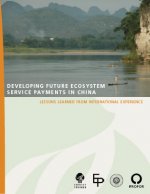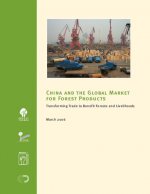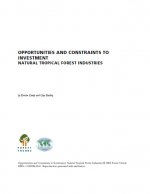Kerstin Canby
Senior DirectorForest Policy, Trade, and Finance Initiative

Kerstin is Senior Director of Forest Trends’ Forest Policy, Trade, and Finance Initiative, overseeing Forest Trends’ work on regulatory and market approaches to promote legal and sustainable production and associated trade of timber and other commodities harvested from forest areas, as well as policy and public finance for forests. Increasingly, this work is highlighting illegal land use / conversion, the role of conversion timber in the global sourcing of wood fiber, and agricultural supply chains from legal or zero-deforestation zones. A significant portion of her time is spent on the China/East Asia region.
Prior to joining Forest Trends, Kerstin worked at the World Bank developing natural resources management projects and grants, and other forest governance programs. She has advised governments and stakeholders on REDD+ donor programs and FLEGT initiatives in Asia, Africa, and Latin America. She has also worked with the US Forest Service in Oregon and was the co-founder of an environmental education program in Durham, North Carolina. Kerstin holds a BA and Masters of Environmental Management from Duke University’s School of Forest and Environmental Sciences, where she focused on economics, forestry, wetlands, and coastal ecosystems.
Turbulent Times For India’s Timber Trade
A 2021 Update of "India's Wooden Furniture and Wooden Handicrafts: Risk of Trade in Illegally Harvested Wood"
By Michael Richards, Sofia Tenorio Fenton, Naomi Basik Treanor, and Kerstin Canby View PublicationThis report focuses on recent changes in India’s international timber trade, especially over the 2019–2021 period, and the implications (of identified changes) for India’s sourcing of illegally harvested or traded timber. The paper thus provides an update of Forest Trends’ 2020 report India’s wooden furniture and wooden handicrafts: risk of trade in Illegally harvested wood […]
Illicit Harvest, Complicit Goods
The State of Illegal Deforestation for Agriculture
By Cassie Dummett, Arthur Blundell, Kerstin Canby, Michael Wolosin, and Eszter Bodnar View PublicationWhile subsistence agriculture and logging still contribute to deforestation, commercial-scale agricultural expansion is now recognized as by far the single largest driver of deforestation worldwide and thus also of greenhouse gas emissions from land-use change. Several initiatives have quantified how much and where deforestation is driven by commercial agriculture, and even how much of this […]
Dependent Documents
Illicit Harvest, Complicit Goods: Executive Summary
The State of Illegal Deforestation for Agriculture
By Cassie Dummett, Arthur Blundell, Kerstin Canby, Michael Wolosin, and Eszter BodnarIllicit Harvest, Complicit Goods: Case Studies Annex
The State of Illegal Deforestation for Agriculture
By Cassie Dummett, Arthur Blundell, Kerstin Canby, Michael Wolosin, and Eszter BodnarIllicit Harvest, Complicit Goods: Executive Summary
The State of Illegal Deforestation for Agriculture
By Cassie Dummett, Arthur Blundell, Kerstin Canby, Michael Wolosin, and Eszter Bodnar View PublicationIllicit Harvest, Complicit Goods: Case Studies Annex
The State of Illegal Deforestation for Agriculture
By Cassie Dummett, Arthur Blundell, Kerstin Canby, Michael Wolosin, and Eszter Bodnar View PublicationIndia’s Wooden Furniture and Wooden Handicrafts: Risk of Trade in Illegally Harvested Wood
By Marigold Norman and Kerstin Canby View PublicationThis report document’s India’s role in the global timber supply chain, with a particular focus on the extent to which India’s furniture and handicrafts industries’ high demand for wood products from around the world may be driving India’s imports of illegally harvested wood. India’s rapidly expanding furniture manufacturing industries are setting their sights on close […]
China’s Log Imports from Countries with Log Export Bans
Trade Trends and Due Diligence Risks
By Brian Schaap and Kerstin Canby View PublicationChina has imported more than 46 million cubic meters of logs from countries with log export bans from 2005 to 2016. Many of these imports are in violation of log export bans (LEBs) and present a risk to Chinese companies – and their down-stream buyers of processed wood products in North America and Europe – that these logs are illegally sourced. […]
Dependent Documents
Impacts of the Laos Log and Sawnwood Export Bans
By Phuc Xuan To, Naomi Basik Treanor, Kerstin Canby View PublicationDecisive actions taken by the government of Laos, in the form of a Notice (no. 1360 in August 2015) and a Prime Ministerial Order (PM15 in May 2016) prohibiting the export of logs and lightly processed “sawnwood,” appear to be paying off, according to a new analysis by the Washington, D.C.-based organization Forest Trends. The […]
Laos Log and Sawnwood Export Ban
Impacts on the Vietnam-Laos Timber Trade
By Phuc Xuan To, Kerstin Canby View PublicationIn May 2016, the Government of Lao PDR enacted a Prime Ministerial Order (PM15) to ban the export of logs and sawnwood, with the express aim to help control the country’s high deforestation rates and boost Laos’ domestic wood production industry. As a result of PM15, the Vietnamese timber industry has seen an almost immediate the decline in their ability to import logs and sawnwood from Laos. This report identifies in detaild impact of the Lao government’s log and sawnwood export ban on Vietnam’s timber industry by analyzing 2010-2016 Vietnam’s Custom Statistics for the imports of logs and sawn wood into Vietnam from Laos.
National Governance Indicators
Relevance for the Regulation of the Trade in Illegal Timber
By Marigold Norman, Jade Saunders, Kerstin Canby View PublicationThis paper builds on the use of national governance indicators to develop a new relative governance ranking. The relative governance ranking seeks to provide an entry point for buyers of timber products, particularly those in regulated markets such as the EU and USA, who wish to undertake a risk assessment process for forest products sourced […]
Vietnam Customs Data
By Phuc Xuan To and Kerstin Canby - Forest Trends View PublicationREDD+ & POST-CONFLICT
A briefing for the Oslo REDD-Exchange
By Arthur Blundell, Emily Harwell, Kerstin Canby - Forest Trends, Natural Capital Advisors, Forest Trends View PublicationSince the first commitments for Reducing Emissions from Deforestation and forest Degradation (REDD+) were announced in Bali in 2007, more than half of all participating countries have experienced violent conflict involving organized, armed groups (see Figure on reverse). Through programs like the United Nations–REDD Programme, the World Bank-hosted Forest Carbon Partnership Facility and Forest Investment Program, […]
Brexit, FLEGT et le commerce du bois (FR)
By Kerstin Canby, Jade Saunders - Forest Trends View PublicationLe 23 juin 2016, la population du Royaume-Uni s’est exprimée par référendum en faveur d’une sortie de l’Union européenne. Ce référendum étant consultatif, il appartient maintenant au Parlement du Royaume-Uni de se prononcer sur l’activation, les dates et les modalités du processus au terme duquel le pays pourra quitter l’UE, ainsi que le prévoit l’article […]
Brexit, FLEGT, and the Timber Trade (CHIN)
By Kerstin Canby, Jade Saunders - Forest Trends, Forest Trends View PublicationLast week the population of the UK voted in a referendum to leave the EU. The legal status of the referendum was advisory, and thus the UK Parliament must now vote on whether and how to trigger the 2-year process by which the UK can leave the EU. This process is described in Article 50 […]
Brexit, FLEGT, and the Timber Trade
By Kerstin Canby, Jade Saunders - Forest Trends View PublicationLast week the population of the UK voted in a referendum to leave the EU. The legal status of the referendum was advisory, and thus the UK Parliament must now vote on whether and how to trigger the 2-year process by which the UK can leave the EU. This process is described in Article 50 […]
Dependent Documents
Brexit, FLEGT, and the Timber Trade (CHIN)
By Kerstin Canby, Jade Saunders - Forest Trends, Forest TrendsBrexit, FLEGT et le commerce du bois (FR)
By Kerstin Canby, Jade Saunders - Forest TrendsREDD+ & Post-Conflict
A briefing for the Oslo REDD-Exchange
By Arthur Blundell, Emily Harwell, Kerstin Canby - Natural Capital Advisors, Natural Capital Advisors, Forest Trends View PublicationSince the first commitments for Reducing Emissions from Deforestation and forest Degradation (REDD+) were announced in Bali in 2007, more than half of all participating countries have experienced violent conflict involving organized, armed groups. If properly designed, REDD+ programs can strengthen peace and security as much as they can mitigate climate change, improve environmental management, […]
Myanmar Overview
presentation for April 2016 TREE workshop
By Kerstin Canby - Forest Trends View PublicationChina’s Logging Ban in Natural Forests
Impacts of Extended Policy at Home and Abroad
By Xiufang Sun, Kerstin Canby, Lijun Liu - Forest Trends, Forest Trends, Forest Trends View PublicationThis Information Brief explores some of the anticipated economic and ecological implications of the forthcoming expansion of restrictions on commercial logging in China’s natural forests.
China’s Domestic Timber Supply
By Kerstin Canby for Xiufang Sun - Forest Trends View PublicationVietnam and General Mekong-China Trade
By Kerstin Canby - Forest Trends View PublicationWelcome and Overarching Questions
By Kerstin Canby - Forest Trends View PublicationEuropean Trade Flows and Risk
By Rupert Oliver, Kerstin Canby - Forest Industries Intelligence Limited, Forest Trends View PublicationIllegal logging, as defined in the EU Timber Regulation (EUTR), is the harvesting of timber in contravention of the laws and regulations of the country of harvest. Illegal logging is a global epidemic with significant negative economic, environmental and social impacts. Recent studies indicate that illegal logging accounts for 50–90 percent of the volume of […]
Forest Certification in Myanmar (Burmese)
Forest Trends Information Brief No. 3
By Kerstin Canby - Forest Trends View PublicationForest Certification in Myanmar
Forest Trends Information Brief No. 3
By Kerstin Canby - Forest Trends View PublicationThe easing of diplomatic and financial sanctions on Myanmar has sparked western interest in investment and trade opportunities. Interest in the export of world famous Burmese teak has led buyers from the United States, Europe, Japan, and Australia to ask questions about whether logs or timber exported out of Myanmar are legal or sustainable, as […]
Dependent Documents
Forest Certification in Myanmar (Burmese)
Forest Trends Information Brief No. 3
By Kerstin Canby - Forest TrendsThailand
Overview of Forest Law Enforcement, Governance and Trade
By Kevin Woods, Keith Barney, Kerstin Canby - University of California, Berkeley, York University, Forest Trends View PublicationThailand diverges from neighboring regional Mekong countries, with a decade or more experience of actively pursuing policies to combat domestic illegal logging and internal transportation. The 1989 logging ban, and the rise of grassroots social movements organizing around large-scale plantations and community displacement, has meant that Thai forestry institutions have needed to become more responsive […]
Myanmar
Overview of Forest Law Enforcement, Governance and Trade
By Kevin Woords, Kerstin Canby - University of California, Berkeley, Forest Trends View PublicationMyanmar remains one of the world’s only countries with no prohibitions on log exports. The country provides much coveted teak and other hardwood logs to the region and beyond. Sawn wood, and to a lesser extent finished wood products, contribute a relatively small amount to Myanmar’s total exports of wood products. As in the majority […]
Forest Governance in Asia
10 Years after the Bali Declaration
By Kerstin Canby - Forest Trends View PublicationThis article takes stock of what happened since the Bali Declaration was signed ten years ago, in September 2001. The Bali Declaration concluded the East Asia Forest Law Enforcement and Governance (FLEG) Ministerial Conference. Although a non-legally binding document, the Bali Declaration committed the countries represented there – both timber producing and consuming nations – […]
Lao PDR
Overview of Forest Governance, Markets and Trade
By Keith Barney, Kerstin Canby - York University, Forest Trends View PublicationOver the past decade in Lao PDR, new regulations and policies related to logging and timber exports have aimed to conserve existing natural forests and promote a shift towards participatory, sustainable forest management. Still, the main challenge will be to implement these reforms effectively. In addition, over the past five to six years, considerable foreign […]
Dependent Documents
Lao PDR
Overview of Forest Governance, Markets and Trade (Lao)
By Keith Barney, Kerstin Canby - York University, Forest TrendsLao PDR
Overview of Forest Governance, Markets and Trade (Lao)
By Keith Barney, Kerstin Canby - York University, Forest Trends View PublicationChina
Overview of Forest Governance, Markets and Trade (Chinese)
By Sun Xiufang, Kerstin Canby - Forest Trends, Forest Trends View PublicationChina
Overview of Forest Governance, Markets and Trade
By Sun Xiufang, Kerstin Canby - Forest Trends, Forest Trends View PublicationIn 2009, the Chinese wood products industry posted historic highs in terms of imports, production, and market activity. Trade data shows that 2009 imports of forest products were the highest on record, and domestic harvesting reached its highest peak in history in 2008. Domestic markets are booming, and while exports are down by volume, by […]
Dependent Documents
China
Overview of Forest Governance, Markets and Trade (Chinese)
By Sun Xiufang, Kerstin Canby - Forest Trends, Forest TrendsKerstin Canby
By Kerstin Canby View PublicationISSUE 8: ROLE MODELS IN CHINA’S FOREST PRODUCTS INDUSTRY: COMPANIES DEVELOPING CHAIN-OF-CUSTODY SYSTEMS TO PROTECT AGAINST ILLEGAL OR UNSUSTAINABLE WOOD SOURCING
English version
By M. Brady & Kerstin Canby View PublicationThe Chinese wood products industry has come under increasing international attention for its potential role in importing (and re-exporting) wood materials which cannot be verified as having come from sustainably managed or even legally harvested forests around the world. This situation does not mean that all production originating from Chinese mills is illegal, but it […]
Dependent Documents
ISSUE 8: ROLE MODELS IN CHINA’S FOREST PRODUCTS INDUSTRY: COMPANIES DEVELOPING CHAIN-OF-CUSTODY SYSTEMS TO PROTECT AGAINST ILLEGAL OR UNSUSTAINABLE WOOD SOURCING
Chinese version
By Chinese translation by X. SunChina’s Forest Product Exports
An Overview of Trends by Segment and Destinations
By Xiufang Sun, Nian Cheng , Kerstin Canby - Forest Trends, Forest Trends, Center for International Forestry Research, Chinese Center for Agricultural Policy, DFID View PublicationChina is now well recognized as a major timber importer. According to FAO, China has led the world in imports of industrial roundwood since 2001. An analysis of Chinese customs data indicates that China imported a total of 120 million cubic meters (RWE) of forest products in 2004. The dramatic impact this surge in imports […]
Forest Products Trade Between China & Africa: An Analysis of Imports & Exports
By Kerstin Canby, James Hewitt, Luke Bailey, Eugenia Katsigris and Sun Xiufang View PublicationRecent reports of China’s efforts to secure access to natural resources in Africa suggest that timber has already become an important traded commodity between China and the African continent. Many hold a general impression that Africa exports a significant and growing amount of timber to China. However, the true magnitude of the China-Africa forest product […]
China and the Global Market for Forest Products
By Kerstin Canby - Forest Trends View PublicationMore What If: Implications of Increasing Global Demand for Bejing Roast Duck
By Kerstin Canby - Forest Trends View PublicationChina and the Global Market for Forest Products: Transforming Trade to Benefit Forests and Livelihoods
By Kerstin Canby - Forest Trends View PublicationForest Trends’ relevant work program
By Kerstin Canby - Forest Trends View PublicationRussia-China Forest Products Trade: Promoting Sustainable Trade
By Kerstin Canby - Forest Trends View PublicationForest Logging and Timber Processing in Russia: How to Benefit Environment and Livelihoods of Local Communities
By Kerstin Canby - Forest Trends View PublicationChina Trade Trends
By Kerstin Canby - Forest Trends View PublicationOverview of Trade Trends
By Kerstin Canby - Forest Trends View PublicationOverview of Trade Trends (Chinese)
By Kerstin Canby - Forest Trends View PublicationForest Products Trade Between China & Africa
An Analysis of Imports & Exports
By Kerstin Canby, James Hewitt, Luke Bailey, Eugenia Katsigris, Xiufang Sun - Forest Trends, Forest Trends, Forest Trends, Forest Trends, Global Timber View PublicationRecent reports of China’s efforts to secure access to natural resources in Africa suggest that timber has already become an important traded commodity between China and the African continent. Many hold a general impression that Africa exports a significant and growing amount of timber to China. However, the true magnitude of the China-Africa forest product […]
Forest Logging and Timber Processing in Russia
How to Benefit Environment and Livelihoods of Local Communities
By Kerstin Canby - Director, Forest Trade and Finance Program, Forest Trends View PublicationChina Trade Trends
By Kerstin Canby - Director, Forest Trade and Finance Program, Forest Trends View PublicationOverview of Trade Trends
By Kerstin Canby - Director, Forest Trade and Finance Program, Forest Trends View PublicationDependent Documents
Overview of Trade Trends
Chinese
By Kerstin Canby - Director, Forest Trade and Finance Program, Forest TrendsOverview of Trade Trends
Chinese
By Kerstin Canby - Director, Forest Trade and Finance Program, Forest Trends View PublicationChina’s Forest Product Exports
An Overview of Trends by Segment and Destinations
By Xiufang Sun, Nian Cheng, Kerstin Canby - Forest Trends, Forest Trends, Chinese Center for Agricultural Policy, Center for International Forestry Research, DFID View PublicationIn only 7 years, China’s timber product exports have tripled in volume and increased fourfold in value. The total volume of all forest product exports – including both timber and pulp and paper products – is now one-third of China’s total forest product import volume. The total volume of only primary timber products (excluding pulp […]
Developing Future Ecosystem Service Payments In China
Lessons Learned from International Experience
By Sara J. Scherr, Michael T. Bennett, Molly Loughney, Kerstin Canby - Ecoagriculture Partners, Peking University College of Environmental Sciences, Forest Trends, Forest Trends, PROFOR View PublicationAcross the world, the growing scarcity of ecosystem services has led to a flurry of conservation innovations over the past decade in the form of payment schemes and nascent markets for these services. The global economic value of ecosystem services is estimated in the trillions of dollars, though actual payments for protecting these services are […]
China and the Global Market for Forest Products
Transforming Trade to Benefit Forests and Livelihoods
By Andy White, Xiufang Sun, Kerstin Canby, Jintao Xu, Christopher Barr, Eugenia Katsigris, Gary Bull, Christian Cossalter, Sten Nilsson - Forest Trends, Forest Trends, Forest Trends, Center for Chinese Agricultural Policy, CIFOR, Forest Trends, University of British columbia, CIFOR, IIASA, Rights & Resources Initiative View PublicationChina’s spectacular economic growth over the last decade is having a dramatic impact throughout the world. It has become a leading nation in terms of its demand for forest products, and its influence is being felt as far afield as Cameroon and Cambodia, Indonesia and the United States. China is now in the world’s spotlight, […]
Opportunities and Constraints to Investment
Natural Tropical Forest Industries
By Kerstin Canby , Cary Raditz - Forest Trends, Forest Trends, ITTO View PublicationThe global forest products industry represents close to 3% of the world’s gross economic output, and the forests upon which it depends are particularly important ecosystems for the health of the planet and for human well-being. The size of the industry, its links to the rest-of-the-world economy, and the centrality of its resource base to […]
New Opportunities for US Timber Producers Undermined by Illegal Trade from Russia
The European Green New Deal is an opportunity for US timber producers. The European Union’s Green New Deal and other environmental regulations are creating opportunities for North American timber producers. Europe needs to reduce its local timber production by approximately 132 million cubic meters over the next decade to meet The EU Green Deal. This […]
A first step toward high-integrity carbon credits in Liberia
Forest Trends commends the Liberian National Climate Change Steering Committee (NCCSC) for considering a moratorium on carbon trading until their recommendations on supervising the carbon market are finalized. In 2023, Blue Carbon, a Dubai-based company, signed a Memorandum of Understanding with the Liberian government for exclusive rights to generate and sell carbon credits on approximately […]
Progress on bipartisan policy to tackle global deforestation: The FOREST Act has been reintroduced to the US Senate and House of Representatives
On Thursday, November 30, Senators Brian Schatz (D-HI) and Mike Braun (R-IN) introduced the FOREST Act to the United States (US) Senate. It was also introduced in the House of Representatives, with Representatives Earl Blumenauer (D-OR) and Brain Fitzpatrick (R-PA) as original co-sponsors, making this a bicameral, bipartisan introduction. First introduced in October 2021, the […]
New US sanctions against Myanmar banks target billions in revenue
On Wednesday, June 21st, the US Department of the Treasury expanded its sanctions regime against Myanmar and the military junta that overthrew the elected government more than two years ago. The sanctions now target the two biggest state-owned banks: the Myanma Foreign Trade Bank (MFTB) and Myanma Investment and Commercial Bank (MICB), stopping them from […]
China and Brazil have a joint commitment to end illegal deforestation driven by trade. What does this mean for major importers like the EU, UK, and US?
The EU’s new Deforestation Regulation (EUDR), which prevents products linked to deforestation from entering the EU market, was just formally approved by the European Parliament on Wednesday. China and Brazil also recently unveiled their own collaborative effort in a new joint statement, emphasizing a shared commitment to eliminate illegal deforestation and prevent the illegal trade of […]
Vietnamese timber exports to the US, EU and UK are dropping. Will this cause Vietnam’s efforts to ensure legal sourcing of its timber industry to lose momentum?
Vietnam exports of timber products to the UK, EU, and US are down. Export orders since the beginning of 2022 are down significantly, with a 38% year-on-year decline in June and a continued drop by 5.5% in July. Forest Trends supported a Vietnam Timber and Forest Products Association (Vifores) survey of 52 timber companies and […]
US Customs and Border Protection (CBP) finds Chinese timber products fraudulently sold in US as “made in Vietnam” in order to evade tariffs
On January 27, 2022, U.S. Customs and Border Protection (CBP) issued a final “affirmative determination” under the Enforce and Protect Act against the BGI Group (aka the U.S. Cabinet Depot). The CBP ruled that BGI fraudulently evaded antidumping (AD) and countervailing duties (CVD) on wooden cabinets and vanities imported from Vietnam. It was found that […]
How did the EUTR and Lacey Act help instigate investigations into potential corruption in the Brazilian forest sector?
Last week, news broke that Ricardo Salles, Brazil’s Minister of Environment, Eduardo Bim, the Director of the Brazilian Institute of the Environment and Renewable Natural Resources (Ibama – the Ministry of Environment’s administrative arm), and at least eight other officials, are the target of a Brazilian police operation investigating potential corruption, related to the Brazilian […]
The COVID-19 Pandemic: An Update on Our Work
We are preparing for social distancing measures to be widespread and for strong limits on travel until at least June 2020 and possibly as long as a year. This has required some re-strategizing on how we’ll do our work. On the ground Some field research and project implementation will be unavoidably delayed in order to […]
A Dispatch from the Mekong
We are back from the field this week after ten days traveling in the Mekong Basin with our team. Hundreds of millions of people live along the Mekong, and the rate of change in Vietnam, Cambodia, and Laos was stunning. The forces of development are ever-present in demands for raw materials and the construction of […]
Looking Back on Two Decades in the Greater Mekong: “We Can Prevent Deforestation Long Before it Happens.”
What is the greatest driver of global deforestation? The answer may surprise you. Illegal deforestation persistently undermines global efforts to fight climate change. For that reason, for nearly twenty years Forest Trends has pioneered new strategies for tracing the flows of illegal timber across the world, and for working in both producer and consumer countries […]
Six Asian Countries Take Steps to Regulate Imports of Illegal Timber Products
In the past 12 months, Japan, the Republic of Korea, China, Vietnam, Indonesia, and Malaysia have all taken steps to develop import regulations designed to keep illegally logged timber out of their markets. In most cases, timber import regulations give governments the power to penalize companies that trade in illegal timber. The new Asian regulations – when […]
What Does Brexit Mean for Illegal Logging and the Global Timber Trade? (Updated)
The Prime Minister of the United Kingdom (UK), Theresa May, today confirmed that the country will leave the European Single Market[1] in what has become known as a “Hard Brexit”. While the future shape of the UK’s relationship with the EU and other trade partners is still not entirely clear, the announcement rules out a number […]
What Does Brexit Mean for Illegal Logging and the Global Timber Trade?
As the shockwaves from last week’s Brexit developments continue to reverberate around the world, we take a closer look at the implications for the EU Timber Regulation (EUTR) – a key element of global efforts to stamp out trade in illegal timber and wood products – summarized in a new Forest Trends information brief. The […]
Survey Shows Progress on US, EU, and Australian Enforcement Actions against Illegal Logging – What Role Can China Play? (English / 中文)
English | 中文 This month, Forest Trends released the results of the first survey of government agencies responsible for the implementation of the EU Timber Regulation (EUTR), US Lacey Act, and Australian Illegal Logging Prohibition Act (ILPA). The survey quantifies the extent and nature of enforcement activity of these regulations, which aim to combat the […]
How REDD+ Can Help Countries Recovering from Armed Conflict
For almost all forest-rich countries, a major impediment in reversing patterns of deforestation has been weak institutions that have weak rule of law. That becomes an even greater obstacle in countries with a history of armed conflict. A new Forest Trends analysis of countries supported by the U.N.’s Reducing Emissions from Deforestation and forest Degradation […]
Cambodia’s Crackdown on Illegal Logging Leaves Room for Doubt
Editor’s note: This post was revised on March 3, 2016 to reflect a previous update. Last month, Cambodia’s prime minister created a national committee charged with curbing illegal wood trade on the country’s eastern border with Vietnam, and the government and military conducted raids to seize illicit timber and investigate high-profile business leaders allegedly involved in the trade. […]
Forest Protection Scores a Big Win with Lumber Liquidators Settlement
Last week, FT Senior Analyst Jade Saunders outlined the full breadth of the consequences facing Lumber Liquidators after its new plea agreement with the U.S. Department of Justice (DoJ) was finalized in federal court. In part two of our series, FT’s Forest Trade and Finance Program Director Kerstin Canby explains why the case could signal […]
Brazil’s “First Step” Toward Curbing Deforestation
In a joint statement Brazilian President Dilma Rousseff and U.S. President Barack Obama have laid out concrete actions and targets for combating climate change. As part of the agreement, announced during recent Rousseff’s visit to Washington, D.C., Brazil’s government has committed to restoring 12 million hectares (more than 46,000 square miles) of forest by 2030, further pledging to increase the share of non-hydropower renewables in its electricity generation mix to 20% during the same time frame.

